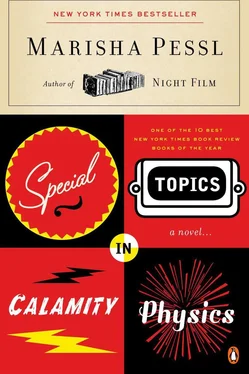According to one of Dad’s little-known history texts, Les Faits Perdus (Manneurs, 1952), the Storming of the Bastille would never have happened, if one of the demonstrators outside the prison, a barley farmer by the name of Pierre Fromande, had not noticed a prison guard pointing at him and calling him un bricon (“fool”).
On the morning of July 14, 1789, Pierre was on a short fuse. He’d had a fight with his voluptuous wife, Marie-Chantal, for her flirting sans scrupule with one of their field hands, Louis-Belge. Pierre, overhearing the insult, dimly aware the prison guard had the same chunky Roquefort torso of Louis-Belge, lost all self-control and charged forward screaming, “C’est tout fini!” (“It’s all over.”). The frenzied crowd followed, believing he was speaking of the reign of Louis XVI, though Pierre was, in fact, referring to the image of Marie-Chantal screaming in pleasure in barley fields, Louis-Belge melting all over her. Yet Pierre had misunderstood the well-meaning guard, who’d simply pointed at Pierre and shouted, “Votre bouton ” when dressing that morning, Pierre had missed the third button on his chemise.
According to Manneurs, most of history has played out under similar circumstances, including the American Revolution (the Boston Tea Party was the work of 1777-era frat boys) and World War I (Gavrilo Princip, after a day with his drinking buddies, the Black Hands, fired a few rounds into the air, simply to show off, just as Archduke Ferdinand cruised by in his royal arcade)(p. 199, p. 243). Hiroshima was unintentional too. When Truman told his Cabinet, “I’m going in,” he wasn’t, as was believed, referring to a Japanese invasion, but giving voice to the simple desire to take a dip in the White House pool.
My revolution was no less accidental.
That Friday, a Know-Your-School Sorbet Social was held after lunch. Students mingled with teachers on the stone patio outside the Harper Racey ’05 Cafeteria, feasting upon a selection of exclusive French sorbet, doled out by the Head Chef, Christian Gordon. Eager students (including Radley Clifton with his belly peeking out of his partially untucked shirt) swarmed around the key Gallway administrators (doubtlessly those in charge of end-of-year honors; “Brown-nosing in this day and age backfires,” Dad attested. “Networking, hobnobbing — it’s all painfully out of season.”). After saying modest hellos to a few of my teachers (smiling at Ms. Filobeque, who stood rather forlornly under a hemlock, though in reply she only pursed her lips) I headed to my next class, AP Art History in Elton House, and waited in the empty classroom.
After ten minutes, Mr. Archer appeared, carrying his tub of Mango sherbet and I’M EARTH FRIENDLY biodegradable satchel (see “Red-eyed Tree Frog,” The World of Ranidae: From Frog Princes to Tadpoles , Showa, 1998). He had so much sweat on his forehead he looked like a glass of iced tea.
“Would you mind helping me set up the slide projector for the lecture?” he asked. (Mr. Archer being EARTH FRIENDLY was APPARATUS HOSTILE.)
I agreed, and was just finishing loading the 112 slides, as the other students began to arrive, most of them with big, slurpy grins on their faces, tubs of sorbet in hand.
“Thank you for your assistance, Babs,” Mr. Archer said, smiling at me and affixing his long, sticky fingers to the top of his desk. “Today we finish up with Lascaux and turn to the rich artistic tradition that emerged in the area that is now southern Iraq. James, will you get the lights?”
Unlike Pierre Fromande, I’d heard the man correctly. Unlike Truman’s cabinet members, I’d understood his true meaning. Certainly, I’d been given aliases by teachers before, from Betsy and Barbara to “You in the Corner” and “Red, No, I’m Kidding.” From years twelve to fourteen, I actually believed the name was cursed, that it was whispered among instructors “Blue” had the erratic properties of a ballpoint pen at high altitudes; if they uttered the name, a permanent blueness, dark and inexorable, could very well leak all over them.
Lottie Bergoney, Instructor of the Second Grade in Pocus, Indiana, actually telephoned Dad and suggested he rechristen me.
“You won’t believe this!” Dad mouthed, cupping his hand over the receiver, gesturing for me to listen on the other line.
“I’ll be honest with you, Mr. Van Meer. The name’s not healthy. The kids in class make fun of it. They call her navy. A few of the smart ones call her cobalt. And cordon bleu. Maybe you should think about alternatives.”
“Might you suggest some possibilities, Miss Bergie?”
“Sure! I don’t know about you, but I’ve always loved Daphne.”
Perhaps it was Mr. Archer’s particular choice of name, Babs, the nickname of a restless wife wearing no bra during her tennis lesson. Or perhaps it was the confidence with which he said it, without a trace of uncertainty or second thought.
Suddenly, at my desk, I couldn’t breathe. At the same time, I wanted to leap from my chair and shout, “It’s Blue, you sons of bitches!”
Instead, I reached into my backpack and removed the three letters, still tucked into the cover of my assignment notebook. I reread each one, and then, with the same clarity that overtook Robespierre as he lounged in a bath and liberté, egalité and fraternité sailed into his head — three great merchant ships coming into port — I knew what I had to do.
After class, I used the student payphone in Hanover to call Dad at the university. I left a message explaining I wouldn’t need a ride home until 4:45; I was meeting with Ms. Simpson, my AP English teacher, to discuss her Great Expectations for research papers. At 3:40, after confirming in the Hanover ground-floor ladies room that I had sat on neither gum nor chocolate, that I had nothing in my teeth and had not accidentally pressed my ink-stained hand against the side of my face leaving it a mosaic of black fingerprints (as I had once before), I walked, as composedly as I could, over to Barrow. I knocked on the door of 208 and was instantly greeted with a few flat, unsurprised voices: “It’s open.”
Slowly, I opened the door. Four flour-pale kids sat at desks in a circle at the center of the classroom, none of them smiling. The other desks had been pushed to the walls.
“Hi,” I said.
They stared at me sullenly.
“I’m Blue.”
“You’re here for the Dungeons & Dragons Demonology Guild,” a kid pronounced in a squeaky voice like air being let out of a bicycle tire. “There’s an extra player’s handbook there. Right now we’re choosing our roles for the year.”
“ I’m Dungeon Master,” clarified a kid quickly.
“Jade?” I asked hopefully, turning to one of the girls. It wasn’t a terrible guess: this one, wearing a long black dress with tight sleeves that ended in medieval Vs on top of her hands, had green hair that resembled dried spinach.
“Lizzie,” she said, narrowing her eyes suspiciously.
“You know Hannah Schneider?” I asked.
“The Film Studies teacher?”
“What’s she talking about?” the other girl asked the Dungeon Master.
“Excuse me,” I said. Holding onto my tight smile like some crazed Catholic her rosary, I backed out of Room 208, hurried back down the hall and stairs.
In the aftermath of being brazenly hoodwinked or swindled, it’s difficult to accept, particularly if one has always prided oneself on being an intuitive and scorchingly observant person. Standing on the Hanover steps, waiting for Dad, I reread Jade Whitestone’s letter fifteen times, convinced I’d missed something — the correct day, time or location to meet, or perhaps she’d made a mistake; perhaps she’d written the letter while watching On the Waterfront and had been distracted by the pathos of Brando picking up Eva Marie Saint’s tiny white glove and slipping it onto his own meaty hand, but soon, of course, I realized her letter was teeming with sarcasm (particularly in the final sentence), which I hadn’t originally picked up on.
Читать дальше












